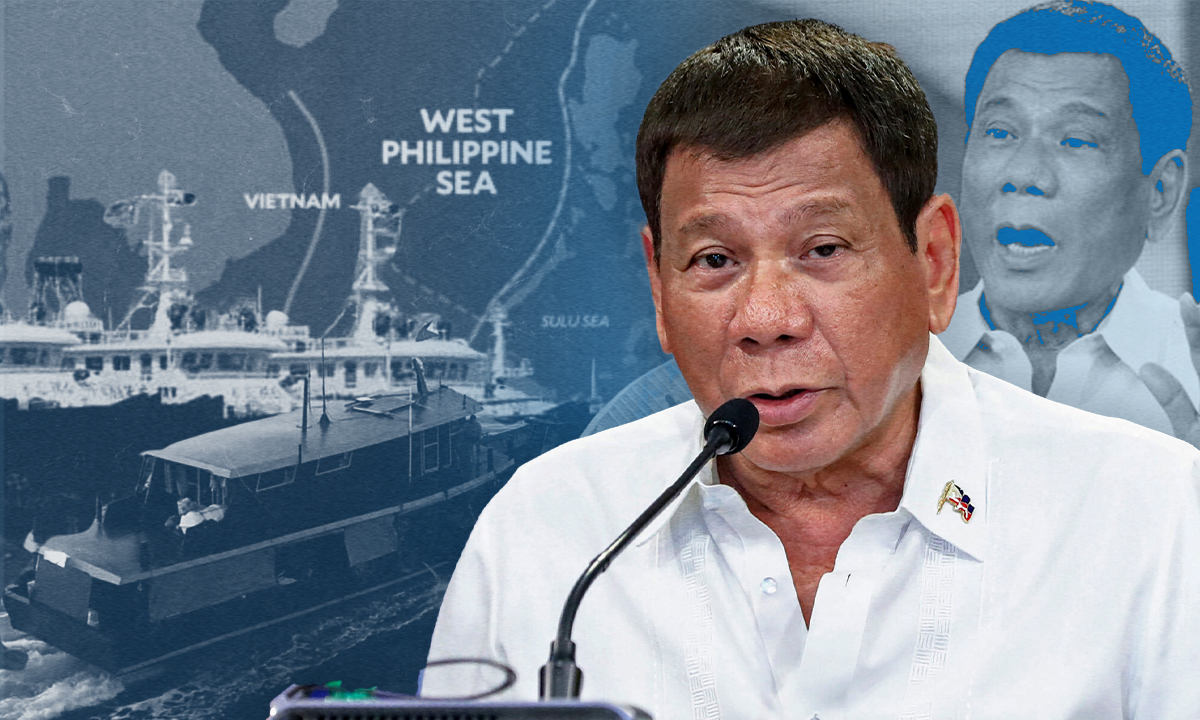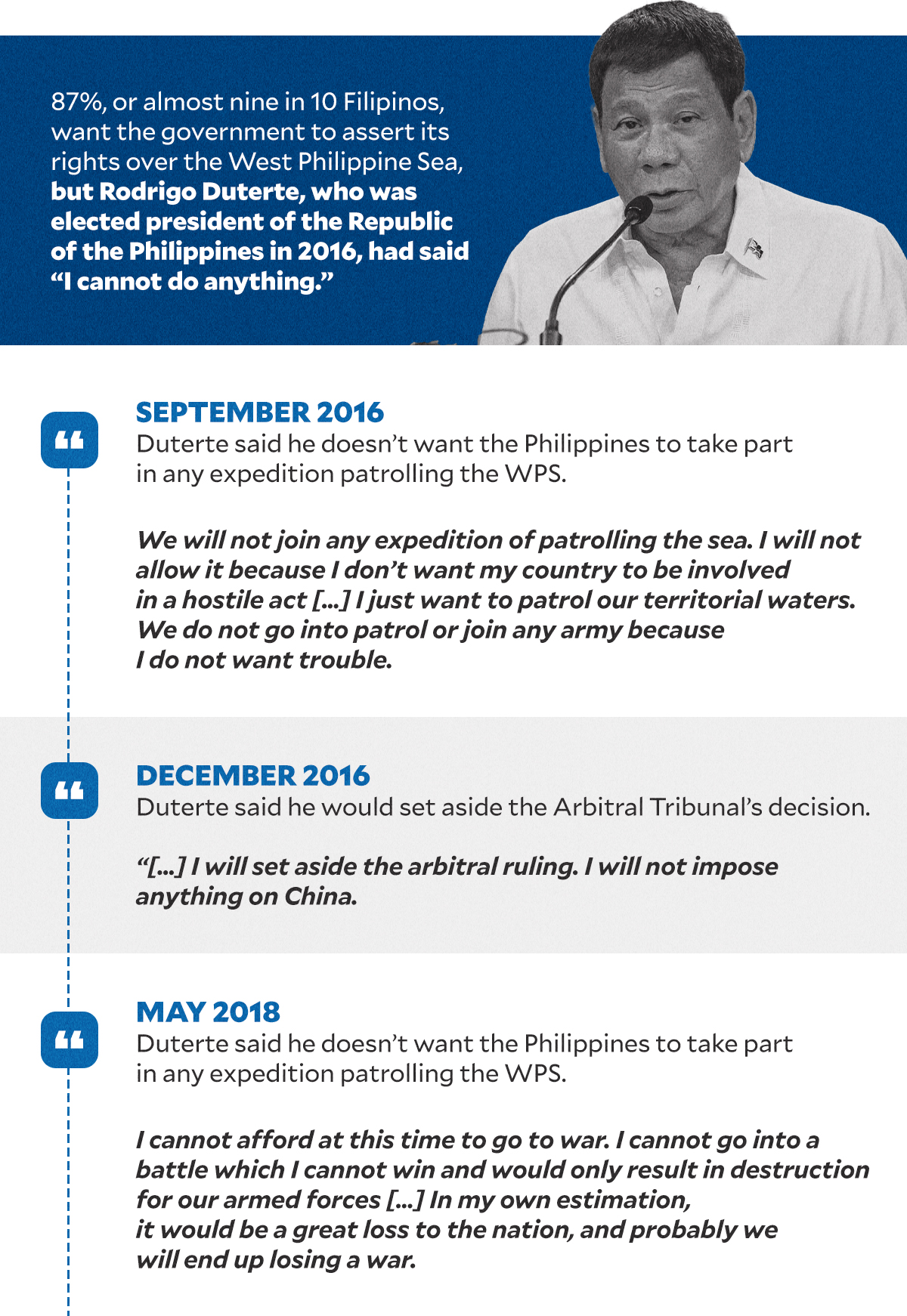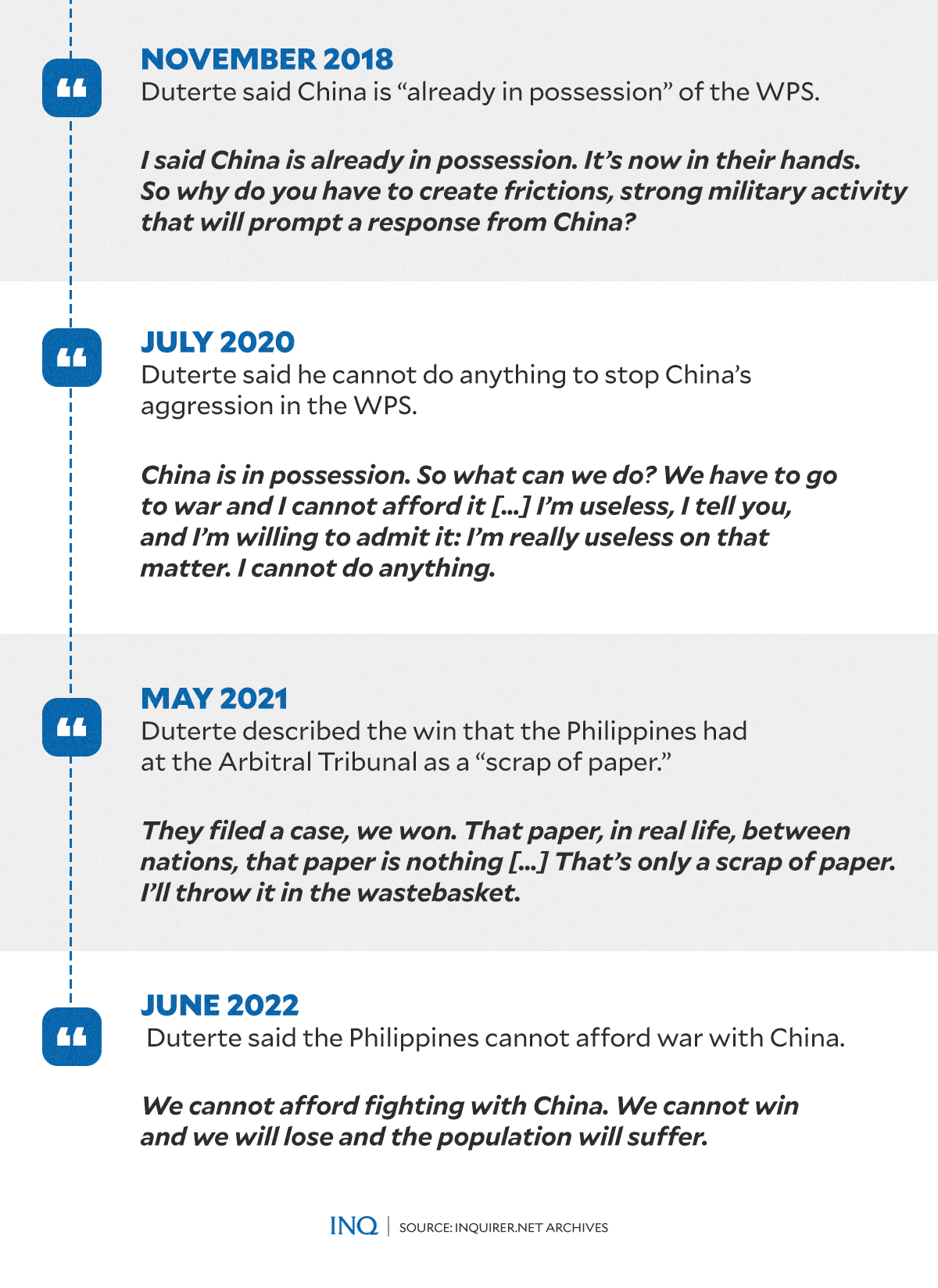When words, actions speak loud: Duterte’s honeymoon with China

West Philippine Sea and Rodrigo Duterte composite image from INQUIRER file photos
MANILA, Philippines—“I would say ‘this is ours and do what you want with me’.”
This was the declaration of Rodrigo Duterte in 2016, less than a month before he was elected as president of the Philippines.
At that time, he said that should China disregard the decision of the Permanent Court of Arbitration (PCA), which was still pending then, he would ride a jet ski to the West Philippine Sea (WPS) to assert what is “ours”.
It came on as a strong statement of patriotism that even then senator Panfilo Lacson expressed belief that it helped turn the tide for Duterte’s victory as many Filipinos believed the then presidential candidate would really ride a jet ski to assert Philippine sovereignty.
Back then, only a few had considered defending the WPS as an issue they were most concerned about, based on a survey conducted by Pulse Asia.
But only a few months later, already as president, Duterte said the Philippine Navy would no longer take part in joint patrols in Philippine exclusive economic zone with its main defense ally, the United States.
In so many words, Malacañang then pointed out that Duterte did not want to be viewed by China as hostile even as the Asian giant continued its intrusion into the WPS despite the PCA ruling that its then nine-dash line claim on Philippine waters and other parts of South China Sea was illegal and without basis.
READ: Duterte determined to stop joint patrols in South China Sea
Duterte tried to swallow the strong statement he made in the campaign to ride a jet ski in asserting Philippine sovereignty. He said it was, after all, just “nonsense” and empty talk since it’s impossible in the first place to reach WPS on a jet ski.
He said he would run out of gas and could be overwhelmed by the waves. “I told myself this is hard […] I am afraid to die,” said Duterte as he addressed Filipinos to explain why the jet ski bravado was just that, an empty boast.
READ: Duterte: Jet ski promise just a campaign joke, stupid
Aside from a sprinkling of what could be deemed as asserting Philippine sovereignty in WPS, most of Duterte’s six-year presidency was defined by his pivot to China, a shift away from long-time ally the United States.


GRAPHIC: Ed Lustan
In his first visit to China in 2016, shortly after becoming president, Duterte said it was “time to say goodbye” to the US.
Duterte even reached a point when he described the legal victory of the Philippines against China at the PCA as a worthless scrap of paper that should be thrown in a wastebasket, a statement that China echoed almost verbatim
.
“They filed a case, we won. That paper, in real life, between countries, is nothing,” Duterte said on May 5, 2021. “In the language of hoodlums, I will tell you, give it to me and I will tell you: Son of a b*tch. That’s just a piece of paper. I’ll throw it in the wastebasket,” the then president said.
After over two months, or on July 12, 2021, China said: “The award of the arbitration is illegal, null and void. It is nothing more than a piece of waste paper.”
READ: Why do China, Duterte descriptions of arbitral ruling look the same?
Duterte said, too, that he will not impose anything on China, and that the Philippines cannot go to war with China: “I cannot go into a battle which I cannot win and would only result in destruction for our armed forces […] In my own estimation, it would be a great loss to the nation, and probably we will end up losing a war.”
Secret deal
Duterte, throughout his six-year presidency, had been criticized for not strongly invoking the Philippines’ sovereign right over the WPS, with a coalition saying in 2021 that Duterte’s response to China’s aggression inside Philippine EEZ led to the gradual, but certain erosion of what could have been a strong Philippine stand. It was, the coalition said, “a continued diminution of our maritime rights.”
This year, a revelation shed light on Duterte’s denigration of the PCA decision, and even the downplay of China’s aggression in the WPS—a “gentleman’s agreement” between him and Chinese dictator Xi Jinping.
It was not clear, however, when the deal was made, although Duterte stressed that nothing was compromised in the agreement, which was to “respect the status quo” in the WPS.
Duterte’s successor, Ferdinand “Bongbong” Marcos Jr., has repeatedly expressed shock at the secret agreement and exasperation at his failure to get details from the Duterte camp. Marcos said he was “horrified” at the prospect of Philippine territory and sovereignty being compromised.
INQUIRER.net has reached out to Duterte’s former spokespersons, lawyers Harry Roque and Salvador Panelo, but both have yet to comment, especially on how the supposed “gentleman’s agreement” has influenced Duterte’s stand on China’s intrusion in Philippine EEZ and its claim to own the entire area.
But according to Joshua Espeña, vice president of the think tank International Development and Security Cooperation, Duterte’s “geopolitical view of the WPS is peace through the status quo with China, with economic partnership perceived as more beneficial than risking confrontation in the WPS.”
“However, this view is not necessarily a ‘shared reality’ by Manila’s foreign and security policy establishments,” Espeña, a lecturer at the Polytechnic University of the Philippines, told INQUIRER.net.
He said although Duterte had the prerogative to set the direction of foreign policy, “it may not be necessarily welcomed by those institutions, given how Duterte’s predecessor, Benigno Aquino III, institutionally built the momentum to clarify Manila’s geostrategic interests in the WPS.”
For Espeña, “I think Duterte knew the risk of how the[se] institutions and the public might react if this [gentleman’s agreement] gets leaked to the public. “
“However, in displeasure at the Marcos Jr. administration, China calculatingly lashed out by making the agreement known,” Espeña said.
He said this left Duterte no choice but to admit that he made that secret agreement while at the same time denying he compromised Philippine territory and sovereignty.
Solid as rock
According to lawyer Rodel Taton, dean of the San Sebastian College Recoletos – Graduate School of Law, the agreement highlighted the close personal relationship between Duterte and Xi.
This relationship, however, is “now on the rocks,” Taton told INQUIRER.net when asked about his view of the deal, which, Duterte said, had an end goal of averting an armed confrontation between Manila and Beijing.
At one point, Duterte even described China as a “good friend”, saying that he would not want to go to war with China because “we owe it a big debt of gratitude, among others for the vaccines [it has donated to us].”
The Philippine government, under Duterte, bought hundreds of billions of pesos worth of COVID vaccines from China.
According to Duterte, “we do not want trouble with them, especially a war.”
READ: PH won’t go to war with ‘good friend’ China, says Duterte
Duterte’s honeymoon with China extended to defending COVID-related transactions involving the controversial Pharmally Pharmaceutical Co. and his former economic adviser and equally controversial businessman Michael Yang, a Chinese national who maintained a residence in upscale Forbes Park.
READ: Duterte defends Chinese ex-adviser Yang amid alleged ties to Pharmally
Back in 2021, the Senate Blue Ribbon Committee started a motu propio (on its own) investigation of spending for COVID-19, which has eventually shed light on how a barely year-old company with a capitalization that is not even one percent of the amount of supply contracts it bagged from the government was able to win such contracts.
Duterte declared that no crime was committed, but last year, the Office of the Ombudsman recommended the filing of charges against government officials and private individuals linked to the controversial deals between Pharmally and the government.
Yang, a Chinese businessman, who was appointed by Duterte as his economic adviser, has been named by Pharmally executives as their “financier”. Yang dismissed it, however, saying that “in actuality, it’s the money of [my] friends.”
READ: Pharmally funding came from friends, not me, Michael Yang insists
Duterte initially denied it, saying that it is not possible because Yang is Chinese, but Panelo later confirmed that Yang was indeed one of Duterte’s economic advisers.
Chinese propaganda
Aside from revealing the deal, China is relentlessly stressing, too, that there was a promise to remove the BRP Sierra Madre, which is serving as an outpost for the Philippines in Ayungin Shoal. The Marcos administration said it was not aware of any deal and if such existed, then it was immediately rescinded.
Taton said he believed an agreement on sovereignty issues “is a fiction, if not part of the propaganda of China thinking that it can sway and change the tide by painting the Philippines as a state that cannot keep its word, one that provokes and is not keen to dialogue and communicate, albeit bilaterally.”
“It is not even an issue of who can communicate what or who can keep the word because China is notoriously not keeping obligations in good faith,” Taton said.
“If there is sincerity on the part of China, all these should be channeled through the course of international law and not use might and provocations short of war but obvious threat,” he said.
“We still stand on the rules-based settlement rather than overshadowing might. The Philippines should stand its ground and continue rallying for support of the international community, realpolitik, alongside international relations,” Taton said.














